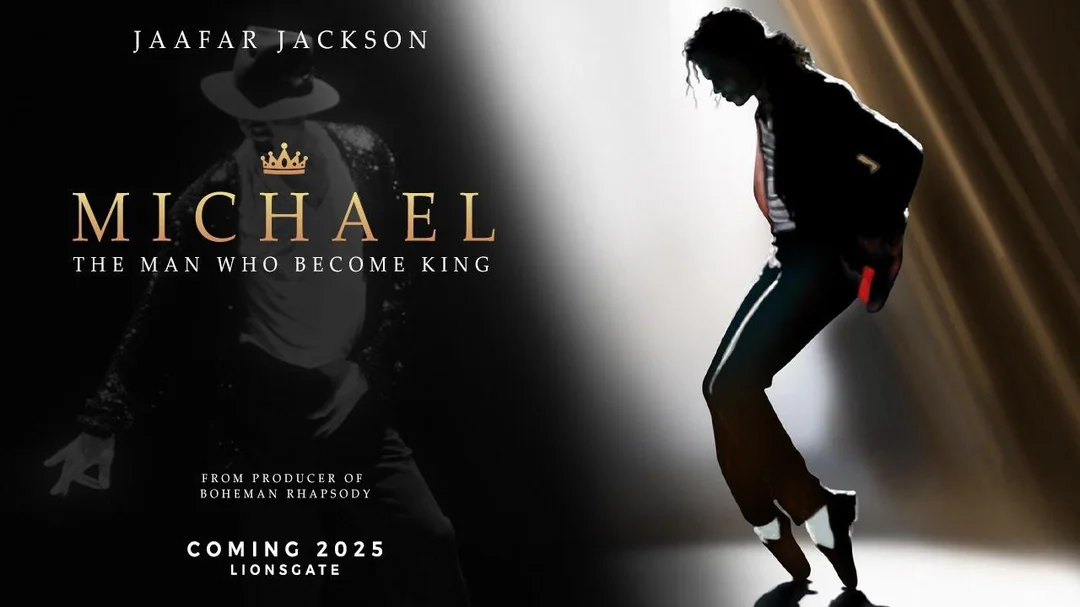When Lionsgate announced Michael in early 2023—complete with Kingsman producer Graham King, Training Day director Antoine Fuqua, and a screenplay by Oscar-nominee John Logan—it sounded like the rare music biopic with both estate approval and serious cinematic pedigree. Initial buzz pegged the film for April 18, 2025. By last autumn the date had slipped to October 3, and this spring the studio confirmed another major pause: reshoots, a possible two-film rollout, and a new window after April 2026—some insiders even whispering 2027.
What happened, and what does it mean for the most expensive music biopic ever mounted? Here’s a deep dive into the latest developments.
Release Timeline at a Glance
| Date | Milestone | Notes |
|---|---|---|
| Nov 2019 – Feb 2022 | Rights secured, Lionsgate boards project | Jackson estate grants full music catalog access. |
| Jan 2023 | Antoine Fuqua confirmed as director, Jaafar Jackson cast | First-look rehearsal clip blows up on social media. |
| Nov 2024 | Release moved from April 18 → Oct 3 2025 | Post-production extended to polish choreography sequences. |
| May 2025 | Lionsgate Q4 earnings call: film “likely to miss FY 2026” | Reshoots triggered by legal constraints around the 1993 Jordan Chandler settlement. |
| June 2025 | 22-day additional photography block begins in L.A. | Footage count passes 3.5 hours, tipping decision to split the movie. |
| Current | Target window: fiscal 2027 (exact date TBA) | Studio weighing staggered release—Part 1 one quarter, Part 2 the next. |
Why the Sudden Reshoots?
A previously overlooked clause in Jackson’s 1994 civil settlement prevents dramatization of the Chandler family without consent. Early cuts leaned heavily on that storyline, forcing the creative team to restructure the third act, excise names, and craft new narrative bridges. Rather than abandon hard-won footage, Fuqua is re-shooting courtroom and tabloid-era sequences with composite characters while preserving musical set pieces already in the can.
Legal headaches aren’t the only factor: test-screened material reportedly soared past three hours, reviving the age-old studio worry that a single epic might leave ticket sales on the table. Splitting the film allows Lionsgate to keep pivotal 1988–1993 content while devoting a full second chapter to the star’s final, more controversial years.
The Two-Part Structure
Part One (working runtime ~150 min)
- Childhood and Jackson 5 breakout
- Solo stardom through Thriller’s record-shattering run
- The apex of 1988’s Bad World Tour—ending before the first scandal breaks
Part Two (script in flux)
- Dangerous-era ambitions vs. mounting scrutiny
- 1993–2005 legal battles and media circus
- Final rehearsal days for This Is It in 2009
Splitting essentially mirrors how Bohemian Rhapsody capped Queen’s Live Aid triumph while skipping Freddie Mercury’s final years. Here, though, Lionsgate wants to confront later controversies—just within tighter legal guardrails.
Cast & Creative Team Highlights
| Role | Performer | Why It Matters |
|---|---|---|
| Michael Jackson | Jaafar Jackson | The 27-year-old nephew nails vocal cadence and footwork; estate calls his screen test “uncanny.” |
| Joe Jackson | Colman Domingo | Fresh off an Oscar win, Domingo has vowed to show “humanity and humor” behind the stern patriarch. |
| Katherine Jackson | Nia Long | Reunites with Domingo after Rustin; brings warmth to family scenes. |
| John Branca (estate lawyer) | Miles Teller | Anchors the legal drama framing device. |
| Director | Antoine Fuqua | Using long-take Steadicam shots to replicate concert energy. |
| Writer | John Logan | Three-time Oscar nominee (Gladiator, The Aviator, Hugo). |
| Cinematographer | Dion Beebe | An Academy Award winner (Memoirs of a Geisha) known for stylized concert lighting. |
Budget, Scale, and Music Rights
- Estimated cost: $150–$155 million—surpassing Elvis and Rocketman, making Michael the priciest music biopic to date.
- Full master-recording access secured, meaning original multitracks of Billie Jean, Beat It, and Smooth Criminal will feature rather than cover versions.
- Universal Pictures will handle overseas rollout, mirroring the Bohemian Rhapsody distribution model that drove a $910 million global haul.
How It Compares to Recent Music Biopics
| Title | Budget | Worldwide Gross | Critical Focus |
|---|---|---|---|
| Bohemian Rhapsody (2018) | $55 M | $910 M | Heroic career arc; controversy minimized |
| Elvis (2022) | $85 M | $288 M | The toll of fame; split timeline |
| Rocketman (2019) | $40 M | $195 M | Fantastical musical numbers; R-rated honesty |
| Michael (est.) | $150 M | TBA | Two-film deep dive; estate-approved but legally constrained |
The unprecedented budget stems from stadium-level set builds (recreating Wembley ’88 and the Thriller short-film shoot) and a 50-song licensing package—more than double the track count cleared for Elvis.
Next Steps for Fans
- Watch for on-location reshoot buzz in downtown Los Angeles this month.
- Expect a new teaser—minus Chandler references—during Lionsgate’s CinemaCon 2026 presentation.
- International territories could see a staggered premiere, with Japan already locked through Kino Films.
With 22 extra shoot days underway and a mountain of legal red tape finally mapped out, Michael is moonwalking again—just on a longer road to release.
Fans Of Biopics Can Also Try ‘The Imitation Game’
Looking for a captivating historical drama to watch this weekend? “The Imitation Game” tells the remarkable story of Alan Turing, the brilliant mathematician who helped crack the German Enigma code during World War II. The film is currently available to stream on Max and the Max Amazon Channel, with rental and purchase options on platforms like Apple TV, Google Play, and Amazon Video.
Benedict Cumberbatch delivers a powerful performance as Turing, with Keira Knightley starring alongside him as fellow mathematician Joan Clarke. The biopic explores not only Turing’s groundbreaking work that helped shorten the war but also his personal struggles as a gay man in a time when homosexuality was criminalized in Britain.
Released in 2014, the film garnered critical acclaim for its portrayal of this pivotal historical figure whose contributions to modern computing and artificial intelligence remain influential today. The blend of wartime drama, intellectual challenges, and personal tragedy makes this film a compelling watch for anyone interested in history, science, or powerful human stories.
Key Takeaways
- “The Imitation Game” can currently be streamed on Max or purchased through platforms like Amazon Video and Apple TV.
- The film stars Benedict Cumberbatch as Alan Turing, the mathematician who helped crack the Nazi Enigma code during World War II.
- Beyond depicting a crucial wartime achievement, the movie explores Turing’s personal struggles and his lasting legacy in computing.
The Legacy of Alan Turing and ‘The Imitation Game’
The 2014 film “The Imitation Game” brought Alan Turing’s remarkable story to mainstream audiences, highlighting his genius, his crucial role in World War II, and the tragic injustice he faced due to his sexual orientation.
Biographical Elements of ‘The Imitation Game’
Benedict Cumberbatch portrays Alan Turing in “The Imitation Game,” a film that captures key moments of the mathematician’s life. The movie shows Turing’s time at Bletchley Park, where he led a team of cryptanalysts working to crack the Nazi Enigma code.
The film takes some creative liberties with Turing’s story. For example, it suggests he named his code-breaking machine “Christopher” after a childhood friend, adding an emotional layer to the narrative.
While the movie depicts Turing as somewhat socially awkward, it treats him with respect and admiration. His brilliance, determination, and unique approach to problems come through clearly on screen.
The film doesn’t shy away from showing the cruel treatment Turing faced after the war when he was prosecuted for homosexuality.
Alan Turing’s Impact on Cryptography and the War
Turing’s work at Bletchley Park was vital to the Allied victory in World War II. His team’s success in breaking the Enigma code helped track German U-boats and military movements, potentially shortening the war by two to four years.
Beyond the war effort, Turing laid the groundwork for modern computing. His concept of the “Turing machine” became a fundamental model in computer science. This theoretical device could simulate any computer algorithm, establishing critical principles for how computers function today.
His contributions to mathematics, cryptography, and early computing make him one of the most important scientific minds of the 20th century. Experts credit him as the father of artificial intelligence for his groundbreaking paper that introduced the “Turing Test.”
Posthumous Recognition and Reflections on Social Attitudes
Despite his contributions to science and the war effort, Turing faced prosecution for homosexual acts in 1952. He accepted chemical castration as an alternative to prison, and died two years later of cyanide poisoning, widely considered to be suicide.
It wasn’t until decades after his death that Turing received proper recognition. In 2009, British Prime Minister Gordon Brown issued a public apology for Turing’s treatment. Queen Elizabeth II granted him a royal pardon in 2013.
“The Imitation Game” helped bring Turing’s story to a wider audience, sparking discussions about historical injustices based on sexual orientation. His life story has become a powerful symbol of both scientific genius and the harmful effects of discrimination.
The film’s release contributed to increased awareness of the estimated 49,000 men convicted under similar laws in Britain, leading to the 2017 “Alan Turing law” which pardoned men convicted for consensual same-sex relationships.
Creative Portrayal and Reception
The Imitation Game blends historical narrative with dramatic storytelling to bring Alan Turing’s life to the screen. The film’s creative choices in casting, storytelling approach, and historical interpretation all contributed to its widespread acclaim while also sparking debates about historical accuracy.
Casting and Performances
Benedict Cumberbatch’s portrayal of Alan Turing stands as the centerpiece of The Imitation Game. His performance captures Turing’s brilliance and social awkwardness with nuance and depth, earning him an Academy Award nomination.
Keira Knightley brings warmth and intelligence to Joan Clarke, Turing’s colleague and friend. Their on-screen chemistry highlights the complex relationship between these two brilliant minds.
The supporting cast enhances the film’s emotional impact. Mark Strong delivers a compelling performance as intelligence officer Stewart Menzies, while Matthew Goode portrays Hugh Alexander with charisma and complexity.
The ensemble works together seamlessly to create a sense of urgency and high stakes that keeps viewers invested in the codebreaking effort at Bletchley Park.
Critical Acclaim and Awards
The Imitation Game received widespread critical acclaim upon its release. The film was nominated for eight Academy Awards, with Graham Moore winning for Best Adapted Screenplay.
Critics praised the film’s taut direction and emotional resonance. Many compared its prestige biographical approach to other successful historical dramas like The King’s Speech.
The screenplay particularly stood out for its non-linear structure, weaving together three timelines from Turing’s life: his school days, his wartime work, and his post-war persecution.
The final scene, showing Turing after his chemical castration, was especially noted for its emotional impact and as a powerful reminder of the injustice Turing faced.
Accuracy and Artistic License in Historical Representation
While The Imitation Game captures the essence of Turing’s contributions, it takes significant artistic liberties with historical facts. The film invents conflicts and condenses events to create a more dramatic narrative arc.
The portrayal of Turing as socially isolated differs from accounts describing him as eccentric but generally well-liked by colleagues. Hugh Alexander was not Turing’s rival as depicted in the film but actually a supportive collaborator.
The most controversial creative choice involves suggesting Turing might have withheld information from authorities. According to the search results, this portrayal has been criticized as a “new slander” against Turing’s character.
These artistic choices serve the film’s dramatic structure but have sparked important discussions about responsibility in portraying historical figures, especially those who cannot defend their legacy.
Frequently Asked Questions
Many viewers have questions about The Imitation Game, from where to watch it to how accurately it portrays Alan Turing’s life. Here are answers to some common questions about this award-winning historical drama.
Where can I watch The Imitation Game online?
The Imitation Game is available for rent or purchase on several digital platforms. Amazon Prime Video, Apple TV, Google Play, and YouTube offer the film for a small rental fee or purchase price.
The movie can also be found on Vudu and Microsoft Store. Prices typically range from $3.99 for rentals to $14.99 for purchase, depending on the platform and video quality.
Is The Imitation Game available on any streaming services?
As of March 2025, The Imitation Game regularly rotates through major streaming services. Netflix occasionally adds the film to its library, but it doesn’t remain permanently.
Currently, the movie is available on Showtime’s streaming service. Subscribers to Paramount+ with the Showtime add-on can also access the film.
Some library-based free streaming services like Kanopy or Hoopla may offer the film to users with valid library cards.
What movies are similar to The Imitation Game that I can watch?
Fans of The Imitation Game might enjoy “A Beautiful Mind,” which explores mathematician John Nash’s brilliant but troubled life. “The Theory of Everything” offers a similar biographical approach, focusing on physicist Stephen Hawking.
“Hidden Figures” reveals the untold story of female mathematicians at NASA during the space race. “Enigma” is another film about Bletchley Park, though it features fictional characters rather than Alan Turing.
For more Benedict Cumberbatch performances in biographical roles, “The Current War” depicts the rivalry between Thomas Edison and George Westinghouse.
Can I watch The Imitation Game for free on any platforms?
Some public libraries offer The Imitation Game through digital lending services like Kanopy or Hoopla. These services are free with a valid library card.
Occasionally, ad-supported platforms like Pluto TV or Tubi may temporarily add the film to their libraries. These services are free but include commercial breaks.
Trial subscriptions to premium services that carry the film could also provide temporary free access. Just remember to cancel before being charged.
How accurate is the portrayal of historical events in The Imitation Game?
According to historians and the search results, The Imitation Game takes significant liberties with historical facts. Less than 50% of the film adheres to actual events in Alan Turing’s life.
The movie invented entirely fictional characters and created conflicts that never existed. For example, the film portrays Turing identifying John Cairncross as a Soviet spy through a Bible code, which didn’t happen in reality.
While the film captures the importance of cracking the Enigma code, many details about Turing’s work and personal relationships were dramatically altered for storytelling purposes.
Does The Imitation Game explore the theme of Alan Turing’s purported autism?
The film suggests Turing had characteristics consistent with being on the autism spectrum, though it never explicitly labels him as autistic. His character displays social awkwardness, difficulty understanding social cues, and intense focus on his work.
These portrayals align with some historical accounts of Turing’s personality. However, since autism wasn’t well-understood during Turing’s lifetime, any retrospective diagnosis remains speculative.
The movie uses these traits to highlight Turing’s unique perspective and genius while also showing the challenges he faced in connecting with others.







